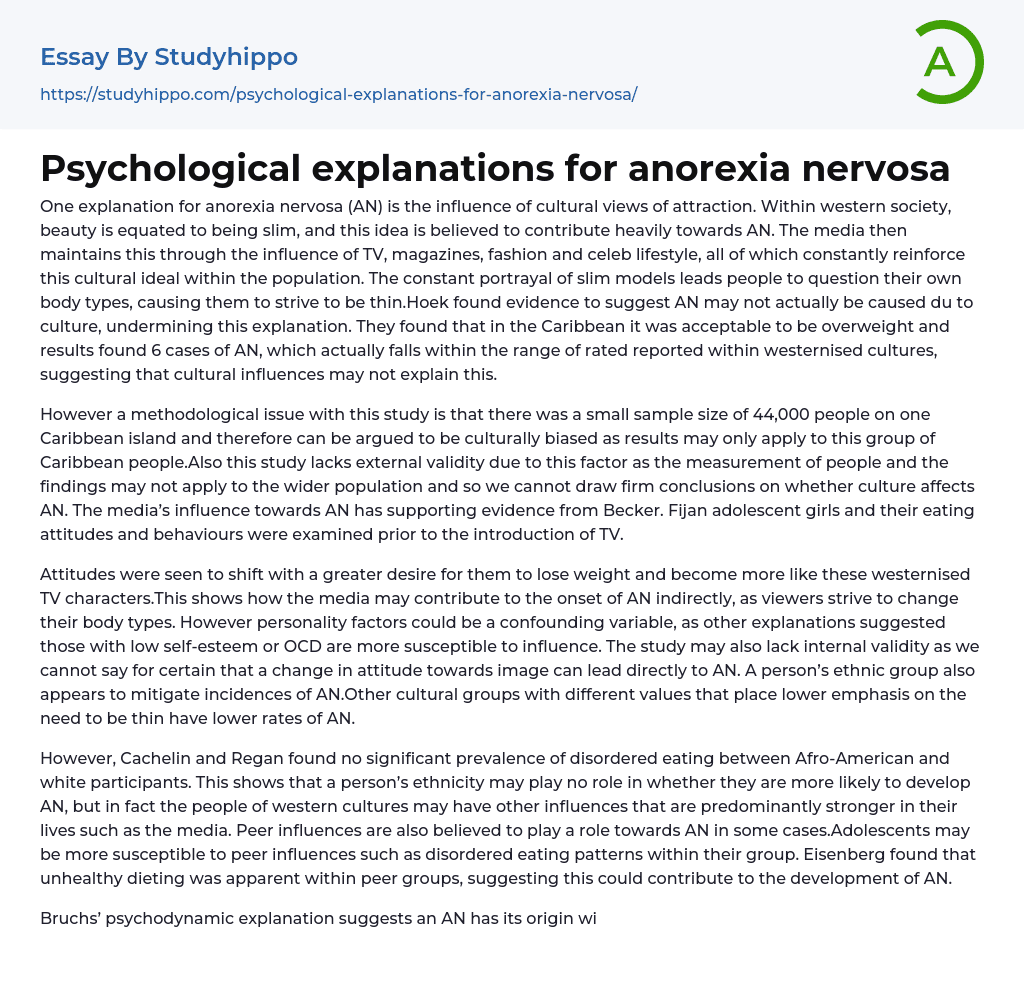

Psychological explanations for anorexia nervosa Essay Example
AN may be explained by the cultural perception of attractiveness, which equates beauty with being thin in western society. This belief is reinforced by the media through TV, magazines, fashion and celebrity lifestyles, causing individuals to strive for thinness. However, Hoek's research challenges this explanation as it was found that in the Caribbean, where being overweight is accepted, AN still occurs at rates similar to those reported in western cultures. Therefore, cultural influence may not be the sole cause of AN.
Despite some methodological limitations, the study's results on the potential cultural bias of anorexia nervosa (AN) may only apply to the 44,000 people from a single Caribbean island. This may affect external validity, making it difficult to draw firm conclusions about the impact of culture on AN. Nonetheless, Becker's research on Fijian adolescent girls highlights the influen
...ce of media on eating attitudes and behaviors, which provides additional support for this claim.
Observations indicate a shift in attitudes towards a desire for weight loss, influenced by westernised TV character depictions. The media's indirect contribution to the onset of AN is highlighted as viewers strive to change their body types. However, personality factors like low self-esteem and OCD could be confounding variables, according to other explanations. The study's lack of internal validity means we can't conclusively assert that a change in attitude towards the body image leads to AN. Ethnic group plays a role in mitigating the incidence of AN, with cultural groups holding different values that put less emphasis on being thin having lower rates of AN.
According to Cachelin and Regan, there is no significant difference in the prevalence of disordered eating among Afro-American and whit
individuals, indicating that ethnicity may not be a determining factor in the likelihood of developing AN. Western cultures may have stronger influences, such as media, that can contribute to the development of AN. Furthermore, peer influences, particularly disordered eating patterns among peers, may also play a role, especially in adolescents who are more susceptible to these influences. Eisenberg's study suggests that unhealthy dieting within peer groups can contribute to the development of AN.
Bruchs’ psychodynamic theory suggests that anorexia nervosa originates in early childhood due to parents' incorrect responses to a child's hunger. This leads to confusion and dependence, resulting in affected individuals feeling a lack of control over their bodies during adolescence, ultimately leading them to develop abnormal patterns as a means of exercising control. However, it is believed that explanations solely focusing on culture, media or psychodynamic factors are oversimplified and reductionist since the development of AN is likely influenced by various factors including media personality and cultural norms. Such deterministic approaches fail to account for free will when choosing not to develop the disorder. Therefore, psychological explanations highlight how environmental elements contribute towards AN development.
The possibility that neural or genetic factors may be responsible suggests that nature could be a significant contributor, according to the biological approach. Nonetheless, the diathesis stress model offers a more comprehensive explanation by acknowledging the involvement of both nature and nurture, with some people possessing a genetic susceptibility and experiencing adequate environmental pressures, resulting in the onset of AN. Thus, highlighting the interplay between nature and nurture. AN development and maintenance are thought to be heavily influenced by personality traits. Perfectionism and impulsivity are common characteristics in
AN sufferers, though impulsiveness is typically associated with bulimia. Research suggests, however, that individuals with AN exhibit greater impulsive behaviour than they admit to.
According to Halmi, the significance of perfectionism as a risk factor for AN is backed by their research which indicates that the level of perfectionism is directly linked to the severity of AN in women. This suggests that individuals with higher levels of perfectionism are more susceptible to developing AN.
- Anorexia Nervosa essays
- Abnormal Psychology essays
- Abraham Maslow essays
- Attachment Theory essays
- Authority essays
- Behaviorism essays
- Classical Conditioning essays
- Cognitive Psychology essays
- Counseling essays
- Developmental Psychology essays
- Educational Psychology essays
- Erik Erikson essays
- Family Therapy essays
- Jean Piaget essays
- Maslow's Hierarchy Of Needs essays
- Mental Health essays
- Operant Conditioning essays
- Personality Psychology essays
- Positive Psychology essays
- Psychoanalysis essays
- Psychotherapy essays
- Sigmund Freud essays
- Social Psychology essays
- Stanford Prison Experiment essays
- Supersize Me essays
- Adolescence essays
- Childhood essays
- Growth Mindset essays
- Individual essays
- Infant essays
- Is Google Making Us Stupid essays
- Anorexia essays
- Breakfast essays
- Caffeine essays
- Chewing gum essays
- Child Development essays
- Chocolate essays
- Diet essays
- Dieting essays
- Eating essays
- Eating Habits essays
- Energy Drink essays
- Food essays
- Genetically Modified Food essays
- Genetically Modified Organisms essays
- Junk Food essays
- Metabolism essays
- Milk essays
- vegetarian essays
- Vitamin essays



